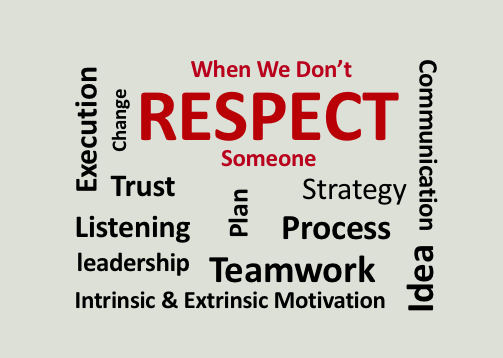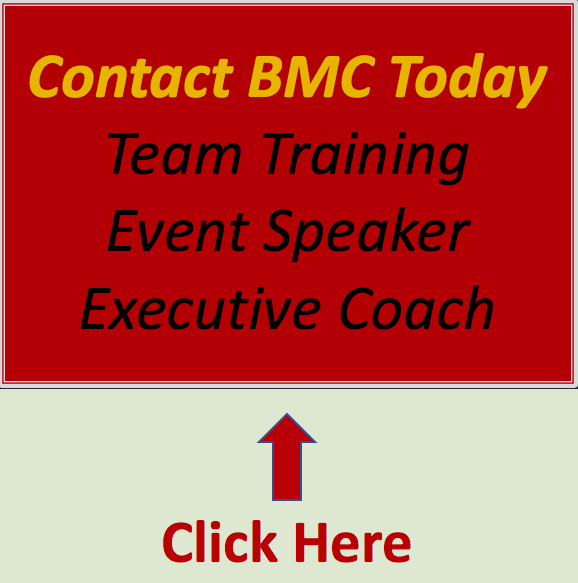What Should We Do When We Feel A Lack Of Respect For Someone?
/Respect is an interesting, complicated thing, and it’s not one size fits all. The point I want to make is that very often we see respect as an absolute. We get caught up in the idea that, “If you don’t respect my idea or my work then you don’t respect me,” and that really doesn’t have to be the case at all… as I described in the four examples below.
Examples: we can:
Respect the person as a human, but not respect their authority or their suggestion or their idea.
Respect the company, but not the person we are engaging with from the company.
Respect how a person is trying to help us, but not the company.
Respect a person’s authority, but not their goals or tactics they use to achieve those goals.
And I’m sure you and I could easily continue adding to this list of examples if we were brainstorming examples.
So what should we do when we feel a lack of respect for someone?
The answer is both simple and complex. It’s so complex there are whole books written and specialists dedicated to only this topic. But let me give you a few steps to get the conversation moving in the right direction. This approach is often the starting point I use when I work with leaders to help them solve a respect challenge with their team or in their company.
Firstly, at the very least we should acknowledge we should be able to show a person respect as a human even if we don’t respect their achievements (or lack of), goals (or lack of), or values (or lack of).
Secondly, we should take a moment to consider where our feelings of respect and lack-of-respect are coming from. Looking inwardly to what we are feeling is always a good starting point in any and every situation including this one. What are we respecting and why (hopefully there is something)? What are we not respecting and why? Do we have an internal, learned bias that is getting in our own way? Might they have an internal, learned bias that is getting in their way?
This is a great exercise to go through (by yourself) for everyone in your inner circle. Take the time to point out what you do and don’t respect / appreciate / admire for those closest to you. It helps especially if find you are feeling negatively triggered by someone because it will help you control (be mindful of) your response.
Thirdly, is our lack of respect creating a barrier between us that is making the situation worse? It’s important to note that this is often the case. You know that when you feel negative energy from someone your own defences usually go up; which in turn often gets reflected back to them as negative energy from you. It is an unfortunate and vicious circle. It’s important to note at this point that whenever respect falters so does trust. When we don’t trust each other everything usually is much more difficult and take much longer. This in turn usually translates to being more expensive and less effective.
Lastly, having reflected on what and why we are feeling as well as what biases we are (or they may be) feeling, how might we be able to build respect and trust within this situation? Generally, there are two areas we can work on and they are:
What We Can Make Sure We Are Doing
What We Can Make Sure We Are Not Doing
Lets explore these two areas.
What We Can Make Sure We Are Doing
Whether we are a leader of a team or an equal member of a team, we can all take a leadership role and set an example through our own behaviour. So, even if we are not feeling respect we can strive to build it with others. To build respect with one or more people we can all practice the following:
Smile and say hello when we pass in the hall
Listen mindfully / with all of our attention in a meeting or conversation
Treat everyone equally
Encourage everyone to be their true, whole self and bring all of their experiences, education and perspective to every engagement
Be transparent with goals and tactics
Give people credit for their ideas… and use other peoples ideas (it can’t be ‘my way or the highway’)
Have a safe environment where people can make mistakes… and learn from those mistakes
Imagine what it’s like to be in someone elses shoes (display empathy)
Everyone can disagree and of course, still be civil and not feel threatened
I encourage you to add to this list because it is far from exhaustive.
The amazing thing is that people who feel respected are not only trusted and more creative, they are:
92% more focused
55% more engaged
61% more likely to embrace change
56% healthier (fewer sick days)
Over 100% more loyal (far less turnover)
Simply put, there are no downsides to having respectful relationships.
What We Can Make Sure We Are Not Doing
Again, whether we are a leader of a team or an equal part of a team, we can all take a leadership role and set an example through our own behaviour. So, how can we begin to build respectful, trusting relationships? The idea is to explore how to build relationships where everyone has an open, safe space where everyone can share ideas by not:
Mocking someone – publicly or privately
Teasing
Telling offensive jokes
Letting someone finish a sentence
Taking credit for someone else’s work
Texting in meetings
Making inappropriate advances
Putting up silos instead of being transparent
Always saying ‘No’ when asked to do something
As I said earlier, I encourage you to add to this list because it is far from exhaustive. But even better, do this with someone else or with your team. Have this and keep this as an open dialogue where you have open and safe dialogues.
If you have a challenging situation and are working to make it better, give it time. Conversations will help and are a sign of a healthy environment. You won’t be perfect at first, and neither will other people. And I dare say you will always make mistakes along the way. The solution isn’t to be perfect, the solution is to be aware of your actions and humble enough that you are able to help others have the confidence to talk with you about challenges or feelings they are having so they can be worked on early.
As I said at the beginning, respect is a simple and yet complex thing. It never happens when there is an environment of secrecy and where people can’t speak freely. As respect begins to grow it is like a seed planted, it will require care and attention and it will grow - seemingly slowly at first but before you know it, you will have a healthy, wonderful space filled with respect… and trust.
Thank you for reading.
Bruce
About Bruce and Bruce Mayhew Consulting.
Bruce is Corporate Trainer and Executive Coach.
As a Corporate Trainer Bruce Mayhew (of BMC) specialize in customized Time Management Training, Email Etiquette Training, Leadership & New Leadership Development, Generational Differences and other soft skills training solutions in Toronto and across Canada. Bruce is also an Executive Coach to a few select clients.
BMC helps your greatest assets think productive and be productive.
Bruce is an experienced motivational speaker in Toronto and has inspired audiences across Canada and within the USA and the UK. Bruce works hard to always make sure your training event, conference, retreat, or annual general meeting is a success.




